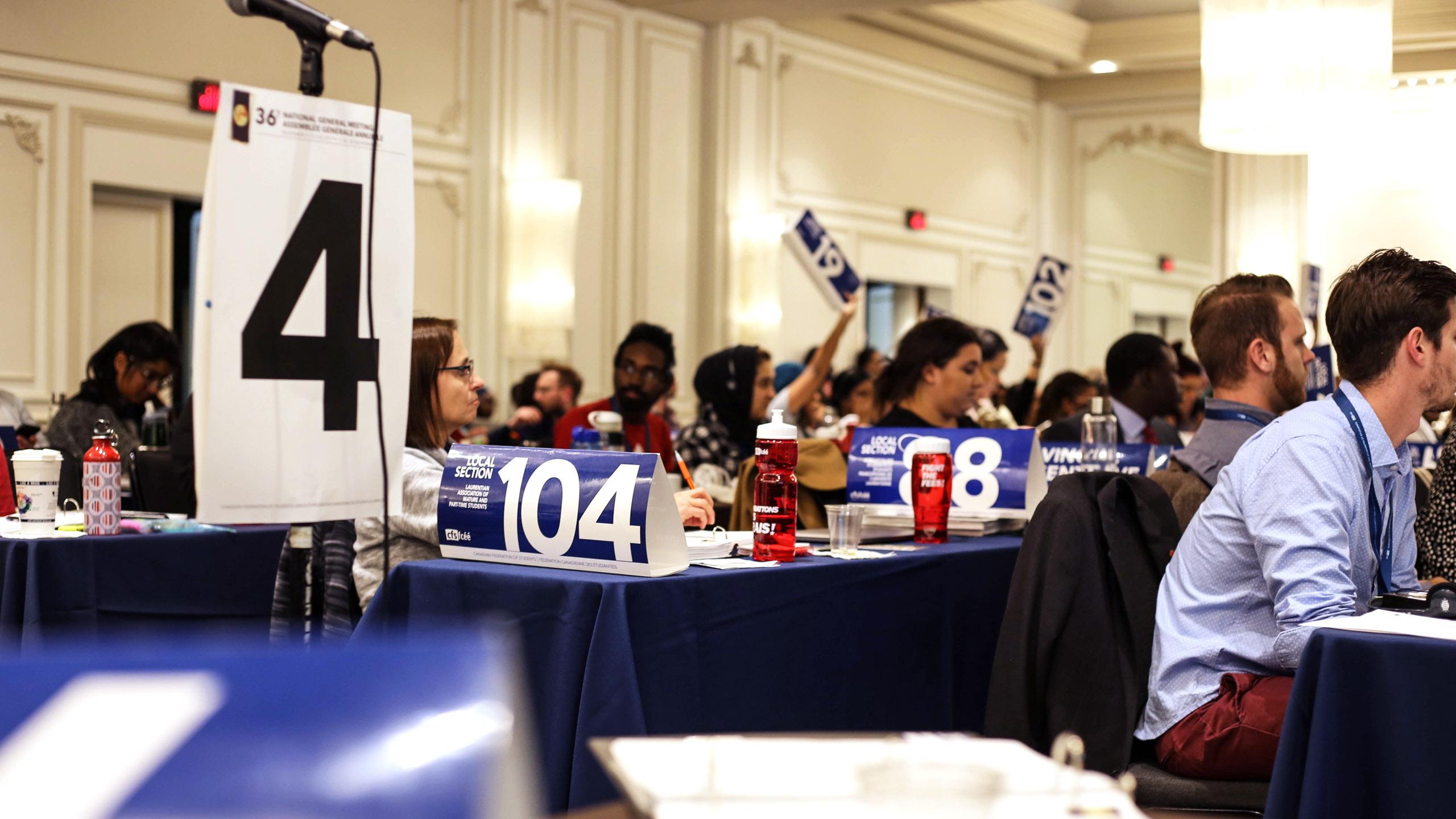By Noushin Ziafati and Annie Arnone
The room rose to their feet as members of the Anishinaabe, and other Indigenous communities engaged the crowd in a drumming and singing ceremony, opening the 36th Canadian Federation of Students (CFS) National Annual General Meeting (AGM) in Gatineau, Que. The songs were incredibly welcoming; everyone in the room tapped the left side of their chests, patting their heart to mimic the beat of the honour song as directed by one of the performers. Never had we seen student politicians so unified.
Unfortunately, the feeling did not last long.
The CFS is the largest national student association in Canada, representing more than 650,000 college, undergraduate, graduate, part-time and international students. The Ryerson Students’ Union (RSU) has been a member of the CFS since 1982. This year, the RSU is paying a total membership fee of $536,000 to the CFS and CFS-Ontario, which goes towards funding campaigns intended to reduce and eliminate tuition fees, while fighting racism, ableism, colonialism and all other forms of oppression that act as barriers to success for students at Ryerson and across Canada.
Major decision-making by the CFS is made at annual national and provincial meetings. These meetings take place twice a year and allow students to examine and debate motions that centre around the policies, direction and priorities of the federation.
This year the AGM ran from Nov. 17 to 20.
Motions were initially introduced at opening plenary, which took place on the first day of the AGM.
We immediately witnessed a clear split among undergraduate and graduate student unions represented by the federation, also known as member locals, including Local 24–our RSU.
Member locals announced their presence at the opening plenary during a roll call—a form of taking attendance. Some did so in the form of song, others by way of chant. The RSU made sure to stand out. RSU vice-president student life & events Lauren Emberson raised her member local card and said “unfortunately, here,” leaving students in the room, and her own president, Susanne Nyaga, with a look of awe on their faces.
Sitting alongside Nyaga and Emberson was RSU vice-president operations Ali Yousaf and Board of Directors (BoD) Senate representative Razi Syed. Vice-president education Daniel Lis eventually joined for the closing plenary. The RSU team was clearly divided, by way of their split-slate nature–comprised of delegates who ran for the RSU elections on pro- and anti-CFS slates. This split was directly translated in their voting throughout the weekend.
According to Nyaga, the best way to represent Ryerson students at the AGM was to abstain from voting if the table did not agree on a motion. Due to differing opinions among the group, the RSU abstained from several motions during the weekend. The ideology to abstain, however, was not shared among the group, resulting in tension among RSU delegates.
A motion that was heavily debated during the opening plenary was for the national executive to release the full, unredacted forensic audit of the CFS secret bank account that was discovered in 2014. Throughout the weekend, the national executive repeatedly mentioned that the full forensic audit of the bank account could not be released as it would put the federation in a position of legal liability. Their legal counsel also advised against it.
Another contentious motion surrounded Selkirk College Students’ Union wanting to defederate from the CFS. The national executive said that Selkirk has not paid their membership fees to the national component, which is why they are unable to leave the CFS.
On the second and third days of the AGM, motions were discussed in closed door constituency group meetings, caucus meetings and subcommittee meetings—where suggestions are made for closing plenary, which followed the next day. The idea behind these meetings is to allow delegates to discuss motions within smaller groups and for motions to be examined and discussed from a diversity of student perspectives, such as in the Racialised Students’ Constituency Group and the Queer Students’ Constituency Group.
The closing plenary, which was as heated as the opening, saw the room divided.
Although a bunch of motions for progressive campaigns passed, such as an anti-fascist motion to condemn the actions of University of Toronto professor Jordan Peterson, the contentious motions that went through several rounds of debates either did not pass or were pulled from the closing plenary agenda. This left a lot of things ultimately unresolved.
At the end, we left the AGM feeling disappointed.
Tension persisted throughout the four-day-long meeting and it’s safe to say the overall feeling shared as a result of the meeting was bittersweet.










Leave a Reply